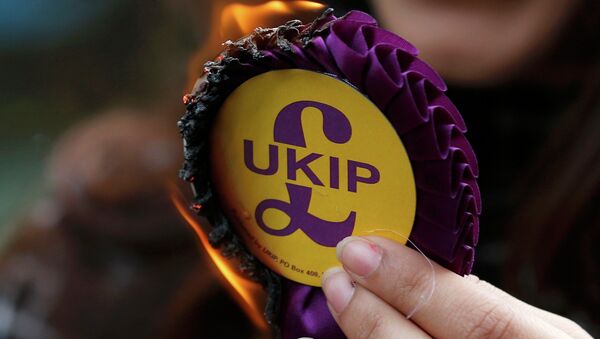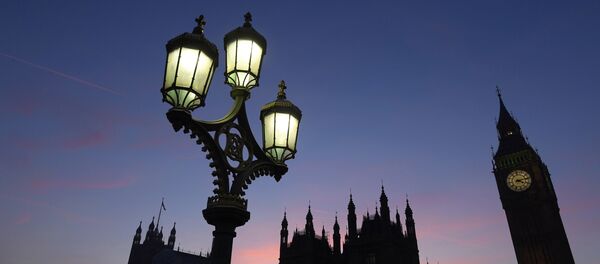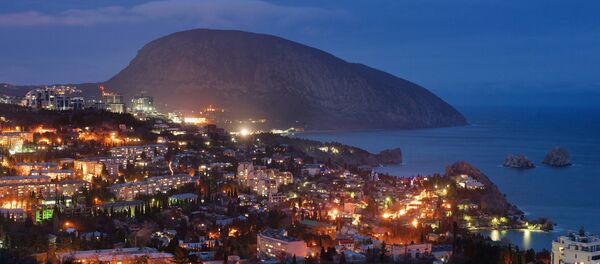MOSCOW (Sputnik) — On March 19, the delegation consisting of around 20 individuals, including members of the European Parliament, politicians from EU member states, CIS countries and Latin America arrived in Crimea for a three-day visit. The group was given a tour through local sights and held meetings with regional authorities.
"The purpose of my visit is to challenge the current rhetoric, to put the case for lifting sanctions. My idea is to write an open letter to the prime minister calling for lifting sanctions and there are also other mechanisms such as petitions that you can start and if you collect 100,000 signatures, it is supposed to be debated in the parliament. I will do everything I can," Sussman, who is also UKIP’s chairman for Enfield and Haringey, said.
"I do believe anti-Russian sanctions are useless and they have to be lifted. I believe that they shouldn't have been applied in the first place and secondly, from what I can see in Minsk II clauses, it looks like Russia is complied with everything that it needs to. The rest is now down to Ukraine to execute. Therefore, it seems to me the time for sanctions is now past and if the West has any integrity at all, it must honor its commitment to confirm that Russia has complied with what it was asked to do," the politician stressed.
Western media coverage of the situation in Crimea is misleading and biased as it deliberately ignores the complexity of the issue in favor of supporting a NATO-led agenda, Nigel Sussman said.
The rationale for imposing sanctions against Moscow remains unclear to the British politician, given that Crimean residents largely accused Ukraine of treating them as second class citizens prior to the region's reunification with Russia.
"My findings were that there was very clearly a referendum and that referendum was very clearly in favor of rejoining Russia and that feeling persists today if not stronger since the Ukrainian blockade. Most of the Crimean citizens indicated that they were treated as the second and third classes citizens in Ukraine. Whether it was deliberately or through the incompetence or just unthinking actions, I do not know, but it obviously had that result," he stated.
According to the politician, the underlying causes for the crisis in Ukraine are deeper than acknowledged by the West and can be tracked back to policy driven by an agenda of NATO preference. The same ideas have awoken anti-Russian sentiments in western media, which, according to Sussman, is very biased in its coverage of Russia.
Sussman added that the rights of Crimean ethnic minorities, such as those of the Tatars, seem to be better protected there than minority groups in Western countries.
"What I did get to do is to attend the meeting with the Mufti of Crimea. It became clear at that meeting that, actually, integration of Tatars under the Russian situation was far better than anyone would expect. In a funny way, I came back with the feeling that the integration of minorities was better in Crimea than in the western countries," Sussman said.
After Crimea decided through a referendum to secede from Ukraine and reunify with Russia in March 2014, Russian authorities have made a number of steps to facilitate minorities' integration. President Vladimir Putin in April 2014 signed a decree rehabilitating ethnic minorities that suffered under the rule of Soviet leader Joseph Stalin, including Crimean Tatars.
However, as Russian human rights ombudsman Konstantin Dolgov told Sputnik in October 2016, the West prefers to ignore progress Russia has made towards protecting human rights in Crimea after the region's reunification with Russia. Thus, on March 17, 2017, the European Parliament adopted the resolution on the situation in Crimea, which, among other things, condemned “grave violations” of the rights of the Crimean Tatars.
Remzi Ilyasov, the head of Qirim movement, believed to be the largest association of Crimean Tatars on the peninsula, told the international delegation that visited Crimea in March that allegations of Tatars’ rights violations were groundless while the minority had been waiting for the document on rehabilitation of the repressed peoples for decades but it had only come after Crimea’s reunification with Russia.




